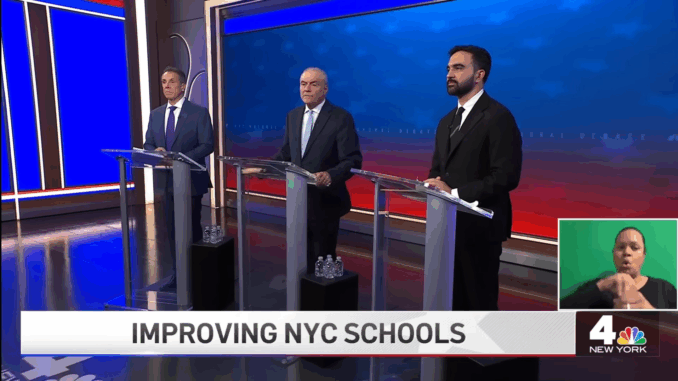
BY ROSSI SEALEY
New York City mayoral candidates Andrew Cuomo and Curtis Sliwa butted heads with Democratic front-runner Zohran Mamdani over the city’s Gifted and Talented education plans during their second and final general election debate at 30 Rockefeller Plaza on Thursday, Oct. 16.
Mamdani confirmed that he would phase out the Gifted and Talented Program (G&T) for kindergartners, as he has already announced. “I do not believe kindergartners should be subjected to a singular assessment,” he said during the second and final mayoral general election debate. He also repeated his call to end mayoral control of the school system.
The city’s G&T program began in the 1970s to provide advanced learning opportunities for eligible elementary students. This program was phased out for incoming kindergartners by former Mayor Bill de Blasio in 2021, but was later reinstated by his successor, Mayor Eric Adams, in 2022.
The program has faced a mix of opinions and backlash for its low rate of including Black, Hispanic, and other students in the program.
Black or Latino students make up 70% of the NYC public school system, and are far less likely to be enrolled in gifted and talented programs than their White or Asian peers, who make up 75% of these programs.
Sliwa, the Republican nominee, and former Governor Cuomo, who is running as an independent, both agreed during the debate that the G&T program should be expanded rather than phased out.
Sliwa said the program doesn’t have enough slots. It currently has 1,900; he wants at least 5,000. Sliwa also emphasized that the tests need to be more available for Black and Hispanic communities.
Brooklyn College student Khalia John, who watched the debate, said she agrees with Mamdani on the G&T program ending for kindergartners but warned it won’t be enough to guarantee greater opportunities for Black and Latino children.
“To be successful in that approach depends on broader changes such as ensuring all schools have equal access to resources, various methods to identify giftedness later on, and supporting all students in those early grades,” said John. “Without addressing these factors they’ll reach the same results, it’ll just show up later down the line.”
Lindsey Gordon, a nine-year NYC teacher and parent, believes the mayoral candidates oversimplify complex education issues like the G&T program. But she can agree on both sides of the G&T program argument based on reading news coverage articles of the debate and her knowledge of these types of programs.
Gordon said that she agrees with Mamdani that all students deserve a high-quality education. She stressed that large classes with students of varying abilities and behavioral issues make it challenging to meet “all” diverse needs. So she advocates for support programs. “I support pull-out or push-in programs that provide targeted support or enrichment to better meet students’ diverse needs,” said Gordon.
Gordon added that she has had concerns that changes to G&T and enrichment programs could affect other students currently in these programs, like her 8-year-old. “If enrichment programs were phased out or scaled back, I think my child might lose some of that excitement and motivation that comes from being challenged and engaged,” said Gordon.
Mayoral control allows the Mayor to have significant authority over the NYC public schools, including the appointment of the school chancellor.
“I’ve been critical of mayoral control because of the ways in which it’s been used to take away the voice of parents, of educators, of students,” said Mamdani during the debate.
By contrast, Cuomo wants to maintain mayoral control and emphasized its importance. “We’d go back to the old system that had local school boards which were corrupt, patronage mills, etc.,” Cuomo said.
Gordon believes her views align more with Mamdani’s: that parents and teachers are losing their voices. But she understands that the situation is not easy. “So while I understand the argument for consistency under mayoral control, I think it’s way more important to build a system that actually listens to the people in it,” said Gordon. “Education should be a shared effort between leadership, families, and teachers—not something dictated from the top down.”
